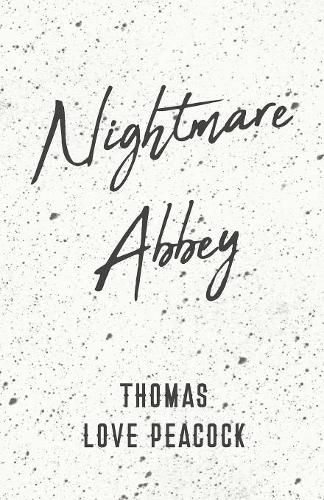Readings Newsletter
Become a Readings Member to make your shopping experience even easier.
Sign in or sign up for free!
You’re not far away from qualifying for FREE standard shipping within Australia
You’ve qualified for FREE standard shipping within Australia
The cart is loading…






This title is printed to order. This book may have been self-published. If so, we cannot guarantee the quality of the content. In the main most books will have gone through the editing process however some may not. We therefore suggest that you be aware of this before ordering this book. If in doubt check either the author or publisher’s details as we are unable to accept any returns unless they are faulty. Please contact us if you have any questions.
First published in 1818, Nightmare Abbey Is a novella by Thomas Love Peacock and his third long work of fiction. It is a Gothic satirical tale that follows Christopher Glowry, Esquire, a melancholic widower who lives with his only son Scythrop in Nightmare Abbey, a run-down mansion that has been in his family for generations. It explores in a comical way the romantic movement in contemporary English literature and its preoccupation with morbidity, misanthropy, and transcendental philosophical systems. This volume is highly recommended for lovers of Gothic literature and satirical writing, and it is not to be missed by those who have read and enjoyed other works by this author. Thomas Love Peacock (18 October 1785 - 23 January 1866) was an English poet, novelist, and important figure in the East India Company. A good friend of Percy Bysshe Shelley, they both had a significant influence on each other’s work. Peacock was most famous for writing satirical novels, which usually involved characters sat around a table discussing contemporary philosophical ideas. Other notable works by this author include: Maid Marian (1822), Gryll Grange (1861), and Melincourt (1817). Many vintage books such as this are increasingly scarce and expensive. It is with this in mind that we are republishing this volume now in an affordable, modern, high-quality edition complete with intoductory essays by Sir Walter Raleigh and Virginia Woolf.
$9.00 standard shipping within Australia
FREE standard shipping within Australia for orders over $100.00
Express & International shipping calculated at checkout
This title is printed to order. This book may have been self-published. If so, we cannot guarantee the quality of the content. In the main most books will have gone through the editing process however some may not. We therefore suggest that you be aware of this before ordering this book. If in doubt check either the author or publisher’s details as we are unable to accept any returns unless they are faulty. Please contact us if you have any questions.
First published in 1818, Nightmare Abbey Is a novella by Thomas Love Peacock and his third long work of fiction. It is a Gothic satirical tale that follows Christopher Glowry, Esquire, a melancholic widower who lives with his only son Scythrop in Nightmare Abbey, a run-down mansion that has been in his family for generations. It explores in a comical way the romantic movement in contemporary English literature and its preoccupation with morbidity, misanthropy, and transcendental philosophical systems. This volume is highly recommended for lovers of Gothic literature and satirical writing, and it is not to be missed by those who have read and enjoyed other works by this author. Thomas Love Peacock (18 October 1785 - 23 January 1866) was an English poet, novelist, and important figure in the East India Company. A good friend of Percy Bysshe Shelley, they both had a significant influence on each other’s work. Peacock was most famous for writing satirical novels, which usually involved characters sat around a table discussing contemporary philosophical ideas. Other notable works by this author include: Maid Marian (1822), Gryll Grange (1861), and Melincourt (1817). Many vintage books such as this are increasingly scarce and expensive. It is with this in mind that we are republishing this volume now in an affordable, modern, high-quality edition complete with intoductory essays by Sir Walter Raleigh and Virginia Woolf.